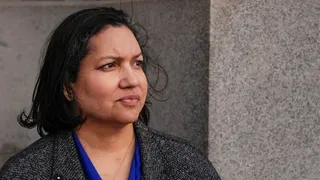July 9, 2012
Tammy Baldwin Looks to End Dems' Wis. Losing Streak
Jason St. Amand READ TIME: 5 MIN.
FRIENDSHIP, Wis. (AP) - Rep. Tammy Baldwin stood in the Friendship Cafe, giving voters a populist pitch for why she should be elected to keep Wisconsin's open Senate seat in Democratic hands, where it's been for the last 55 years.
When she began to field questions, a 70-year-old retiree offered the first comment, and hit on one of the most difficult issues confronting Baldwin as she tries to break the Democrats' recent losing streak in the battleground state.
"I'm not sure how to deal with your situation of who you love and who your partner is," said Harry Davis, a retired Internal Revenue Service worker.
For Baldwin, the first openly gay candidate elected to Congress, questions about her sexuality evoke her reputation as an unabashed liberal and a product of left-leaning Madison, and reinforce concerns about her viability in the more conservative parts of the state she'll need to win the Senate seat in November.
"I ran into all kinds of people who thought Obama was a Muslim," said Davis, a Democratic activist from nearby Adams, adding that he's worried Baldwin will struggle to get votes beyond Dane and Milwaukee counties, the more liberal parts of Wisconsin.
With Baldwin running unopposed in the Democratic primary, attention has been focused on the GOP field, where four Republicans are vying for their party's nod to succeed retiring Sen. Herb Kohl, a Democrat. Leading the pack is former Gov. Tommy Thompson, who has positioned himself as a moderate Republican with the best prospects for winning the general election in a state President Barack Obama won by 14 percentage points in 2008.
But despite her lack of a primary challenge, Baldwin isn't running toward the middle in an attempt to sway independent voters. Instead, she casts her campaign as a fight for the working class while also speaking out about saving Medicare, reforming Wall Street and embracing Obama's health care reform.
Being both a Madison liberal and gay "pretty much can be the kiss of death," acknowledged Jane Witt, chairwoman of the Democratic Party in Racine County, a bellwether. Still, Witt called Baldwin a "damn good candidate" who can win, although she acknowledged the race will be an uphill battle for Democrats.
Democrats are counting on Baldwin to snap a series of losses in Wisconsin that began in 2010, when Republicans took control of both houses of the Legislature, Scott Walker was elected governor and tea party favorite Ron Johnson knocked off then-Sen. Russ Feingold. The defeats mounted when the conservative-backed candidate for state Supreme Court prevailed last year and Walker fought back a recall effort with a decisive 7-point victory in June.
The election could sway the balance of power in a closely divided Senate come 2013. The GOP needs a net gain of four seats to take over, or three if Republican Mitt Romney is elected president, giving his vice president the tie-breaking vote.
Baldwin, who was first elected to the House in 1998 after serving six years in the state Assembly, is popular in liberal Madison, where she has been re-elected with more than 60 percent of the vote every two years since 2002.
But she's far less known in the rest of the state, where the party desperately needs to build support among swing voters. And Baldwin's Democratic agenda will be tough to sell to a divided electorate that has repeatedly rejected many liberal ideals in the aftermath of the Great Recession.
In an interview at the Who Cares? bar and grill, she said the key is positioning herself as the candidate who cares more about the concerns of voters, not Washington insiders and powerful special interests.
Democratic strategists and union leaders claim she can win, citing statewide support for previous Madison liberals, including Feingold and Jim Doyle, the former two-term governor and three-term Wisconsin attorney general.
"The Wisconsin electorate, they're different," said Marty Beil, executive director of the 23,000-member Wisconsin State Employees Union, which has backed Baldwin. "Just because Russ Feingold lost and Scott Walker was re-elected doesn't mean we're headed to the tea party with our bibs on here."
Anyone who won't vote for her because she's gay wouldn't support her even if she were straight, said Sachin Chheda, a Democratic strategist in Milwaukee.
Baldwin is working to introduce herself to voters in places like Adams County, a largely rural area where Obama easily prevailed on his way to winning Wisconsin. But in 2010, Adams County shifted to the right, along with the rest of the state, and elected Johnson to the Senate over Feingold. And last month Walker carried the county by 10 percentage points as he claimed victory in the recall election.
Racine County followed a similar path, backing Obama and then supporting Walker in both his initial bid for governor and in the recall.
With the Republican candidates bickering amongst themselves, Baldwin spent the spring and early summer quietly building her campaign, raising money, meeting with activists and introducing herself to voters. She embraced hot-button topics like health care reform while emphasizing her personal story.
Baldwin, 50, was born to a teenage mother and raised by her grandparents. When she was 9, she was struck with an illness that put her in the hospital for three months. Her grandparents didn't have insurance for her, and Baldwin said they made huge sacrifices to pay her medical bills.
Baldwin uses her own story to help explain her support for Obama's health care overhaul, which requires most Americans to have insurance. She said it makes her angry that her Republican opponents want to "rip it up."
Health care policy also hits close to home for Thompson, who served as Health and Human Services secretary under President George W. Bush. The 70-year-old served 14 years as governor but hasn't been on the ballot in Wisconsin since 1998.
Squaring off with Thompson in the Aug. 14 primary are three more conservative candidates who are trying to tap into the well of tea party support.
Eric Hovde, a millionaire hedge fund manager, has had the highest profile on television. Mark Neumann, a former congressman, has the backing of prominent politicians and conservatives groups. And Jeff Fitzgerald, the speaker of the state Assembly, helped push Walker's agenda through the Legislature.
The most recent poll on the race, conducted in mid-June by the Marquette University Law School, showed Baldwin ahead of or about equal to each of the Republicans except Thompson. He led Baldwin 49 percent to 41 percent - well outside the poll's 4.1 percentage point margin of error.
Conservative groups aren't waiting for the general election to begin attacking Baldwin.
Americans for Prosperity Wisconsin, an anti-tax group, last month launched $400,000 worth of ads against her. That came after the U.S. Chamber of Commerce, in conjunction with the state business group Wisconsin Manufacturers and Commerce, ran a Baldwin attack ad in February.
Wisconsin Republican Party spokesman Nathan Conrad expressed confidence that Walker's recall victory would give momentum to the GOP in the Senate race.
Baldwin, "in one campaign stop after another, opines on how the middle class is struggling and 'taking it on the chin,'" Conrad said. "Yet she fails to mention that her rubber-stamp approval of any and all policies put forth by the Obama administration have driven middle-class prosperity underground."
But other Republicans, including Thompson and Rep. Jim Sensenbrenner, have warned for months not to underestimate Baldwin.
She laughed when asked why the GOP may be dismissing her chances of winning.
"I have no idea," Baldwin said. "They shouldn't."



